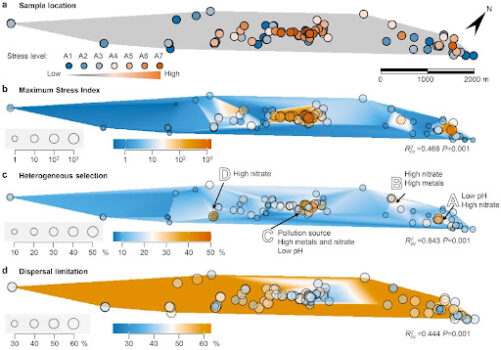Building a fundamental understanding of community assembly, or the process by which microbial communities form, thrive, or die in response to environmental stress, could yield advanced strategies for rehabilitating contaminated sites by manipulating conditions to favor beneficial microbial communities.

In a flagship seven-year study, published this January in the journal Nature Microbiology, ENIGMA researchers explored how environmental stresses influence the composition and structure of microbial communities in the groundwater of the Oak Ridge Reservation (ORR), a former nuclear waste disposal site.
The team, led by Jizhong Zhou, a visiting faculty member in Berkeley Lab’s Earth & Environmental Sciences Area and director of the Institute for Environmental Genomics at the University of Oklahoma, analyzed Oak Ridge groundwater samples for microbial species composition. The sites’ groundwater displayed a wide gradient of environmental conditions and stressors, including contamination with various heavy metals and radioactive materials. The researchers found that in lower-stress conditions, random or stochastic processes were critical in shaping community structure, while in higher-stress conditions, certain species of microbes with a higher tolerance for those stressors fared significantly better.
The study’s wide-ranging analyses and findings on the balance between stochastic and deterministic processes in community assembly have broad implications for ecosystem restoration, environmental monitoring, and even microbial ecology education.
Read more at the University of Oklahoma newsroom.
Publication
Ning, D., Wang, Y., Fan, Y., Wang, J., Van Nostrand, J. D., Wu, L., Zhang, P., Curtis, D. J., Tian, R., Lui, L., Hazen, T. C., Alm, E. J., Fields, M. W., Poole, F., Adams, M. W. W., Chakraborty, R., Stahl, D. A., Adams, P. D., Arkin, A. P., He, Z., & Zhou, J. (2024). Environmental stress mediates groundwater microbial community assembly. Nat Microbiol 9, 490–501. https://doi.org/10.1038/s41564-023-01573-x. OSTI: 2281000
